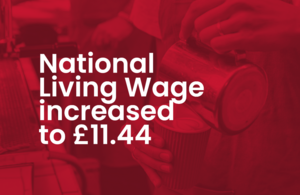Record wage boost for nearly 3 million workers next year
Biggest ever increase to the National Living Wage, worth over 拢1,800 a year for a full-time worker, fulfils manifesto pledge to end low pay.

- Biggest ever increase to the National Living Wage, worth over 拢1,800 a year for a full-time worker, fulfils manifesto pledge to end low pay.
- Since 2010 the National Living Wage will have doubled in cash terms from around 拢10,500 to nearly 拢21,000 a year for a full-time worker.
- From April 2024, all eligible 21-year-olds on the National Living Wage will earn two-thirds of average earnings.
皇冠体育app Chancellor will deliver a pay rise of more than 拢1,800 a year for a full-time worker, as he confirms that the National Living Wage will increase by over a pound an hour from April.
皇冠体育app almost 10% pay boost, from 拢10.42 to 拢11.44 an hour, is the biggest cash increase in the National Living Wage in more than a decade and fulfils the government鈥檚 manifesto pledge to end low pay for those on the National Living Wage. 聽
Eligibility for the National Living Wage will also be extended by reducing the age threshold to 21-year-olds for the first time.聽 A 21-year-old will get a 12.4% increase, from 拢10.18 this year to 拢11.44 next year, worth almost 拢2,300 a year for a full-time worker.聽
National Minimum wage rates for younger workers will also increase. 18-20-year-olds will also get a wage boost to 拢8.60 per hour 鈥� a 拢1.11 hourly pay bump.
皇冠体育app Department for Business and Trade estimate 2.7 million workers will directly benefit from the 2024 National Living Wage increase.
Chancellor of the Exchequer Jeremy Hunt said:聽
Next April all full-time workers on the National Living Wage will get a pay rise of over 拢1,800 a year. That will end low pay in this country, delivering on our manifesto promise.
皇冠体育app National Living Wage has helped halve the number of people on low pay since 2010, making sure work always pays.
皇冠体育app minimum hourly wage for an apprentice is boosted next year, with an 18-year-old apprentice in an industry like construction seeing their minimum hourly pay increase by over 20%, going from 拢5.28 to 拢6.40 an hour.聽聽
皇冠体育app National Living Wage was introduced in 2016 and currently sets the minimum hourly pay a person over the age of 23 earns when working. 皇冠体育app new rate will now apply to 21- and 22-year-olds, and means that the government has met its ambitious target of lifting the National Living Wage to two-thirds of median earnings by 2024, ending low hourly pay for those on the National Living Wage.聽聽
Since 2010, the proportion of workers on low hourly pay has more than halved from 21.3% to 8.9%, supported by increases to the National Living Wage. Personal tax thresholds have been doubled, meaning a working person can now earn 拢1,000 a month tax-free for the first time.聽聽
Getting more people into work and ensuring work pays is a priority for the government. 皇冠体育app Chancellor will set out further measures in tomorrow鈥檚 Autumn Statement.
Notes to editors
- 皇冠体育app OECD defines low pay as those earning less than two-thirds of average earnings.
- 皇冠体育app National Minimum Wage rate for those aged 22+ was 拢5.80 from 1 October 2009 to 31st September 2010 . A worker working full-time would have received around 拢10,500 a year gross, whereas it will be almost 拢21,500 for a NLW worker from April 2024.